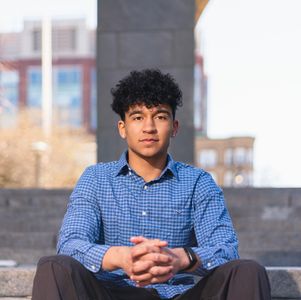The Fight Against a Rare Cancer
Banner photo by Phil DiMartino

Ryse Williams was a high school basketball star in Redondo Beach, California—the Bay League’s 2017 MVP, sinking an average 20 points a game in his senior year. As graduation neared, he was training hard, preparing for life as a college hoops player at Loyola Marymount. He was also fighting cold symptoms he couldn’t seem to shake. Would never shake.
Williams had renal medullary carcinoma, or RMC, a rare, aggressive cancer. There’s little doctors can do to stop its terminal march: most people diagnosed with RMC die within a year. By the time doctors found it in Williams, the cancer had metastasized.
“He came to school one day with flu-like symptoms,” says Alexander “Xan” Wesley, one of Williams’ high school friends. “A week later, he died.”
Williams died in June 2017—one day before his high school graduation. Hundreds mourned the 18-year-old at a candlelit vigil; his passing made national headlines.
“It was a shock to everybody,” says Wesley (’22). Like just about everyone else, he’d never heard of RMC. “I wanted to know a little a bit more about the disease that killed him, so I did some research. And then I wanted to see what I could do to prevent this from ever happening to another young man again.”
In 2020, Wesley founded the Renal Medullary Carcinoma Research Foundation, a registered nonprofit dedicated to raising awareness of the disease and supporting efforts to eradicate it.
Uncommon, Underrepresented
At first, the foundation wasn’t much more than a website with resources for families. As Wesley built the site—coded when COVID lockdowns landed him with unexpected free time—he reached out to the few researchers studying RMC to gather information on symptoms, treatment, trials, and more.
“RMC is a rare renal cancer that predominantly affects young African American men with the sickle cell trait,” says Wesley. Not only is it uncommon, he says, it mainly impacts a group that’s already underrepresented. “There’s a really selectively small group of people who research it. It’s not as widespread or common as something like breast cancer is, so there’s not too much information. I wanted to make a website where someone could go and get comprehensive information about the onset of symptoms and that kind of stuff.”
The foundation has since expanded to be more than a library of resources. In the past year, Wesley has started a scholarship for African American and other underrepresented students interested in medical careers, raised funds for equipment and medicine to treat sickle cell disorders in Sub-Saharan Africa, and provided research grants to support the development of new treatments.
As the organization has grown, he’s been able to fund operations with help from foundations and donors and has even brought on two volunteer staff members. “We get a lot of donations from family members and people around the country who have lost people to RMC.”
Diversity in Medicine
Wesley has also been preparing for his own career in medicine, lining up internships with Boston-area doctors and researchers whose work tackles RMC, as well as doctors in his favored field, neurosurgery. He’s already landed one sought-after mentor, Myron Rolle, a senior neurosurgery resident at Mass General Hospital and a former NFL star. Every year, Rolle mentors young Black men aiming to follow him into medicine, helping them secure internships, giving them clinical experience, and involving them in his research. Wesley recently coauthored a paper with Rolle on traumatic brain injuries.
“I think he would be an outstanding neurosurgeon,” says Rolle, who’s also a global neurosurgery fellow at Harvard Medical School. “He’s got all the essential qualities: discipline, focus, being able to take coaching; he’s a wonderful communicator. He’s incredibly skilled in getting a team together and working together.”
Wesley, who’s a qualified EMT and helped provide health services on LA’s Skid Row before joining BU, says that working with Rolle has given him an additional sense of purpose.
“A lot of studies have been done showing that if an African American man is treated by an African American doctor, their likelihood of getting better quickly is higher. We talked about that,” says Wesley. “It really instilled in me that I had a purpose, I needed to do something to not only better myself, but to better the lives of the people around me.”
And he says that seeing Rolle’s success is inspiring.
“He’s an African American man in that position I want to be in one day, so to see him out there and doing the things he’s doing, it makes me feel like I could do it one day as well.”
It’s one reason Wesley is funding scholarships for “students who are interested in not only researching rare diseases that affect minority communities, but want to be doctors. There’s a huge gap in the amount of minority and African American doctors.”
According to figures from the Association of American Medical Colleges, only 3.8 percent of neurosurgeons in the United States are Black. Rolle hopes his advocacy and example—in turn taken up by Wesley—can change that.
“I opened the door for him,” says Rolle. “Alexander comes through and now somebody sees his story and he opens the door for them, and we continue that pipeline—that’d be a beautiful thing.”
